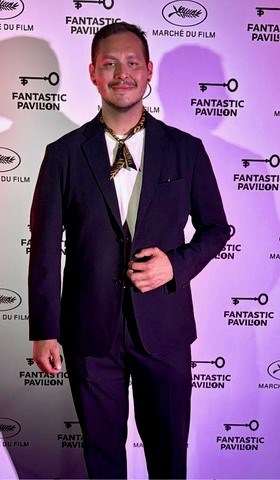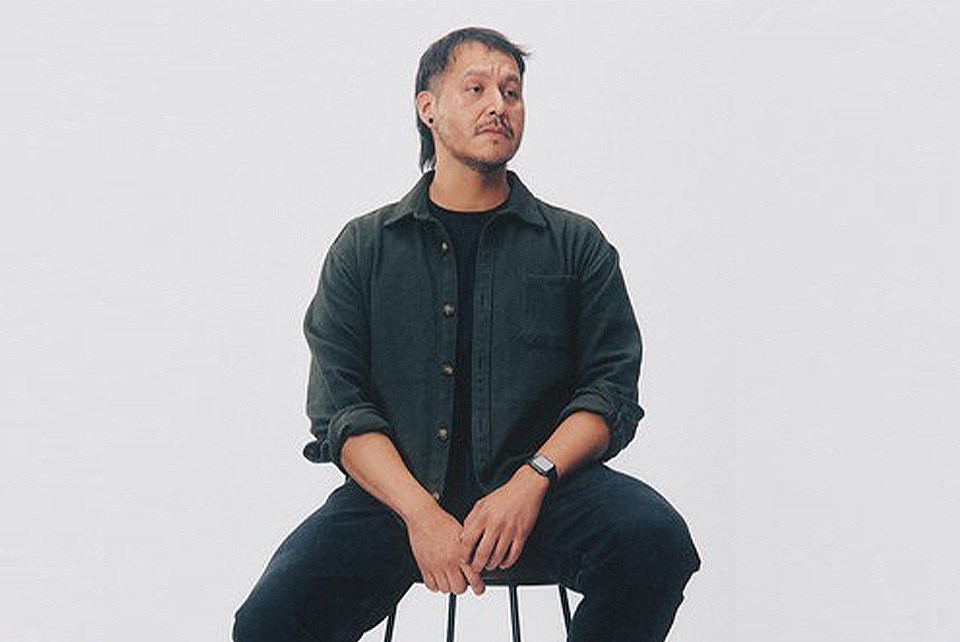KAMSACK — A member of Cote First Nation was in attendance at one of the world’s most prestigious assemblies of movie professionals, the 78th Cannes Film Festival, which took place May 13 to 24 in Cannes, France.
“I was honoured to represent Cote on an international level,” Friday said June 30. “The film festival was surreal, phenomenal and better than I expected.
“It was a lot of hustling, networking and meeting lots of people, but also partying,” he said, admitting that although he would have enjoyed rubbing shoulders with the likes of Kate Winslet, he didn’t have that opportunity.
Among well-known film and television celebrities attending the Festival this year were: Juliette Binoche, Halle Berry, Jeremy Strong, Robert De Nero and Denzel Washington.
Friday said that he was pleased that connections he made resulted in his being interviewed for a story printed in Variety, the premier publication of film, television and theatre and is the essential read for ultra-affluent and influential industry leaders who are sophisticated entertainment consumers.
The story was headlined: “Canadian cinema pushes its evolution with arthouse pics, auteurs, Indigenous filmmakers and animated offerings at Cannes.”
“Canada lands at Cannes with a mission to shift the conversation… from the havoc U.S. tariffs could wreak on the global film industry to the benefits of creative collaboration and co-production with Canadian talent and companies,” the story says. “As this year’s festival and market titles reveal, Canadian filmmakers are twisting horror and comedy into new shapes and reinforcing the country’s historic strongholds of animation and documentary with new ideas.
“Over the past decade, holistic, regionally focused companies have been springing up and producing auteur films that are redefining what Canadian cinema is. Indigenous Canadian films, creators and companies are a catalyst in this gradual paradigm shift and have become a regular active presence at major festivals and markets.
“Rylan Friday, from Cote First Nation, Saskatchewan, is part of the Indigenous Screen Office delegation, which includes producers Paula Devonshire, Cody Lefthand, Gail Maurice and Tanya Talaga,” the Variety story says. “His feature project Terror/Rising expands his 2022 short Terror/Forming (in which Parker and his boyfriend make a gruesome discovery on the way to his late grandmother’s cabin).
“How are Indigenous people living in a modern-day horror story in Canada?” it asks.
“As I continue to explore the horror genre through an Indigenous lens, my goal is not only to depict supernatural terror but also to confront real-life horrors — discrimination, colonialism and the challenges faced by queer and Indigenous communities,” he told Variety. “I believe that by subverting harmful stereotypes and amplifying Indigenous and LGBTQ2S+ voices, we can rewrite narratives that have long been dominated by colonial perspectives, reclaiming space for stories that have yet to be fully told.”
“Cote is a haunted reserve,” Friday said with a chuckle. “I grew up with stories from elders and relatives about little people and to not knock at night. Horror seems to be ingrained.
“What is horror from an Indigenous perspective?” he asked
Born at Kamsack, the son of Randy Friday Sr. of Cote, and Sonia Keshane, Rylan moved with his mother and siblings to Vancouver when he was six years old. After high school, he attended the British Columbia Institute of Technology, graduating in 2013 in radio broadcasting.
After briefly working in radio in New Zealand, Rylan decided radio “was not for me,” and began to study film production.
“I’m a writer, director and producer and have been involved in the film programming of the Vancouver Horror Show and the Vancouver International Film Festival,” he said, adding that he has produced a couple films, including Portraits from a Fire in 2021 which had a small release but is available with video on demand, a documentary, Tea Creek for CBC last year, and a short horror story, Terror/Forming, which he is currently working on to make into a full-length feature.
“My ultimate goal is for greater recognition of queer and Indigenous people, for a better representation in front and behind the camera,” he said, explaining that he teaches filmmaking and was the “first person of colour” to work on the Vancouver International Film Festival.
“I love what I do, a peer-to-peer mentorship program. It’s rewarding,” he said. “One needs to give back to the community. It has taken many years for Indigenous people to get into the film industry and I’m glad to be part of that wave, planting the seeds and nurturing its growth.
“I teach Indigenous horror at Maple Ridge-Pitt Meadows,” he said. “There’s a huge influx of such stories coming out.”
Friday works at Creative BC, which is an industry catalyst and ambassador to help British Columbia’s creative sector reach its economic, social, environmental and creative potential, both at home and globally. The agency delivers a wide range of programs and services with a mandate to expand B.C.'s creative economy.
“I’m always making sure to be planting the seeds,” he said. “But my main focus now is getting my feature film Terror/Rising completed.”
Although as a youth, he would often visit Cote First Nation, he said he “definitely feels a pull to visit,” but recently realized that he had not been back for a number of years. Last year, he was pleased to have been able to screen his short film, Terror/Forming, for students at Chief Gabriel Cote Education Complex.
“The staff and faculty liked the 23-minute film, but it’s hard to gauge what the youth think,” he said of the reception the film received at Cote.

Rylan Friday of Vancouver, B.C., who is a member of Cote First Nation, mingled with giants of the film industry at the 78th Cannes Film Festival in Cannes, France, May 13 to 24. | Photo courtesy Rylan Friday
A multidisciplinary award-winning director, curator, writer and producer, Friday endeavours to “bring an honest discourse of LGBTQ2+ & Indigenous representation to the big screen,” says his webpage. “In 2019, he produced Trevor Mack's debut feature film, Portraits from a Fire and helped implement its peer-to-peer mentorship program for Indigenous youth. Friday has gone onto win the Kevin Tierney Emerging Producer Award, CMPA (Canadian Media Producers Association) Indie Screen Awards out of Prime Time Ottawa 2022 and the Leo Award for Best Motion Picture for his efforts on Mack's debut feature.
His works have screened at VIFF (Vancouver International Film Festival); The Los Angeles Lift-Off Sessions; FNFVF (First Nations Film and Video Festival); Chicago and Festival Mix, Film and Sexual Diversity in Mexico City and imagine Native.
Friday became the first openly queer Indigenous filmmaker to spearhead the 2020 iteration of the Vancouver International Film Festival's (VIFF) Catalyst Mentorship Program, and helped establish and curate the highly successful #Indigeneity series for Reel Causes. He was also the lead curator for the Who We Are Indigenous Film Series, a collaboration with VIFF and the Museum of Vancouver.
In an interview with BC Curates during the VIFF in 2021, Friday said going into the horror genre was a way of deviating away from trauma-based narratives that are so prevalent within intersectional marginalized communities.
“Growing up in the 90s and 2000s, it seemed like most of the stories were told by non-Indigenous creatives,” he told his interviewer. “They were painting indigenous people in this light that there’s always going to be trauma, there’s always going to be tragedy, but that’s not what Indigenous people are. Yeah, we’re suffering the ramifications of colonization and ripple effects of intergenerational trauma, violence and lateral violence in that Indigenous people’s stories are just reduced down to a more palatable stereotype to fit a more western/white/non-Indigenous audience and I thought that it was really important to just reflect the complexities and diversity and what Indigeneity is.
“To celebrate the culture and that’s we’re much more than trauma, but there are these stories of laughter, joy, pain, that are also interwoven and humour of what Indigenous people have. All these experiences and stories shape who we are as Indigenous people.”
“How can non-Indigenous audiences support and uplift indigenous films and storytellers?” he is asked.
“I feel like it’s a great learning opportunity for non-Indigenous people to learn the stories but also get educated through these tales in the curation,” he said. “Hopefully, they can be empowered to do the work, especially with what’s coming out of Kamloops and Regina, and all of these other places. For me, as an Indigenous person growing up on the Cote First Nation out of Saskatchewan, we had two residential schools, as we have three reserves that surround my hometown of Kamsack. Hopefully, with all of this is coming to the surface and this curation furthers a drive for the need for more education.”
“Queer and Indigenous youth need to celebrate Indigenous brilliance,” Friday said. “If you can see it, you can believe it; if you feel shy but have a passion, you’ve got to follow it. I’m glad my calling is in film.”




